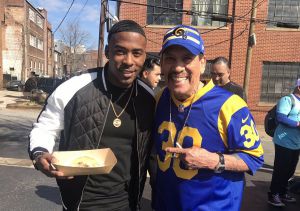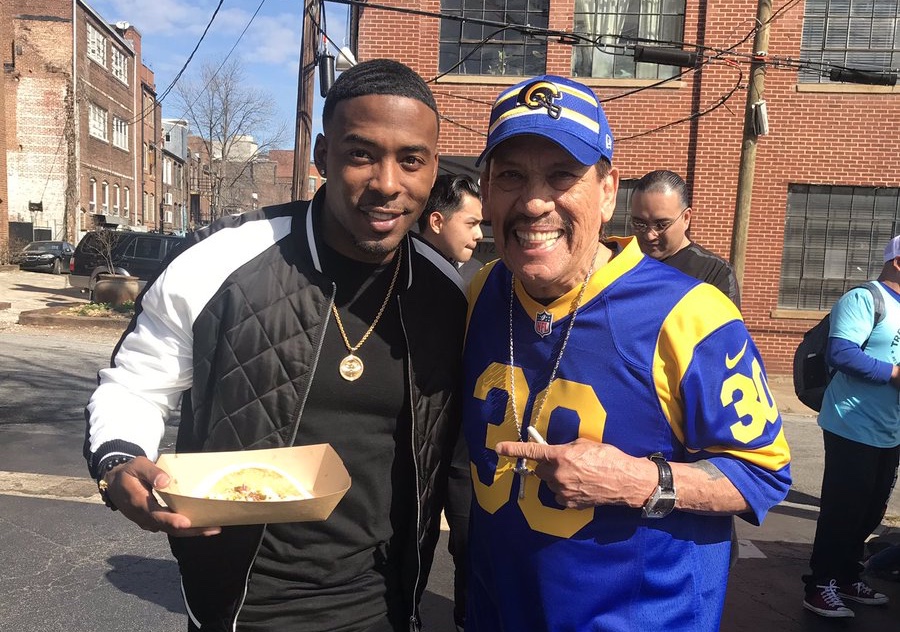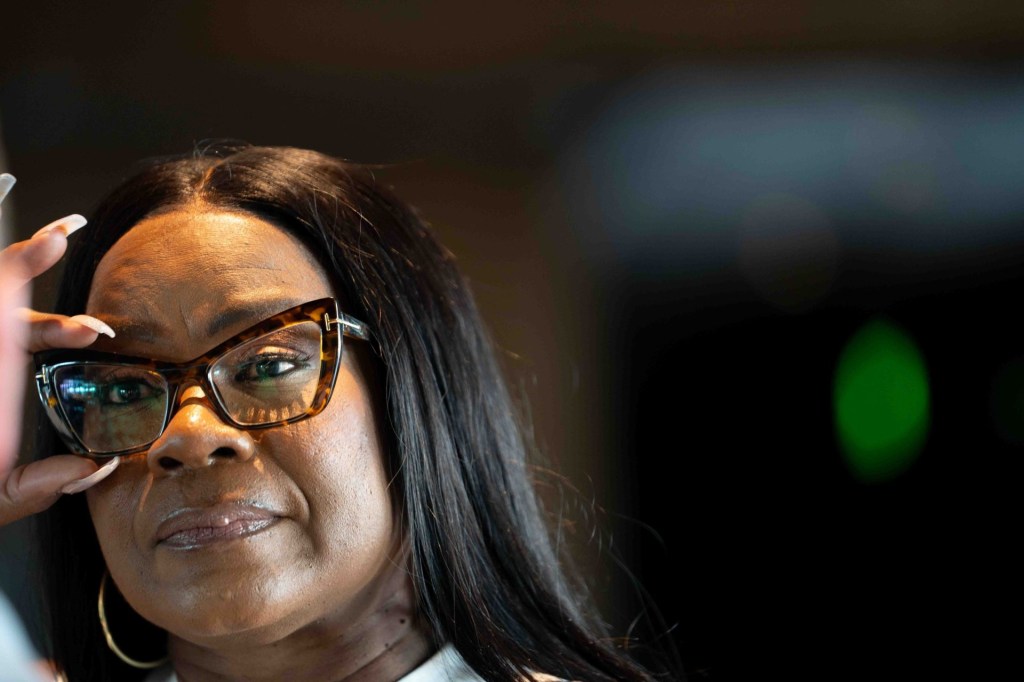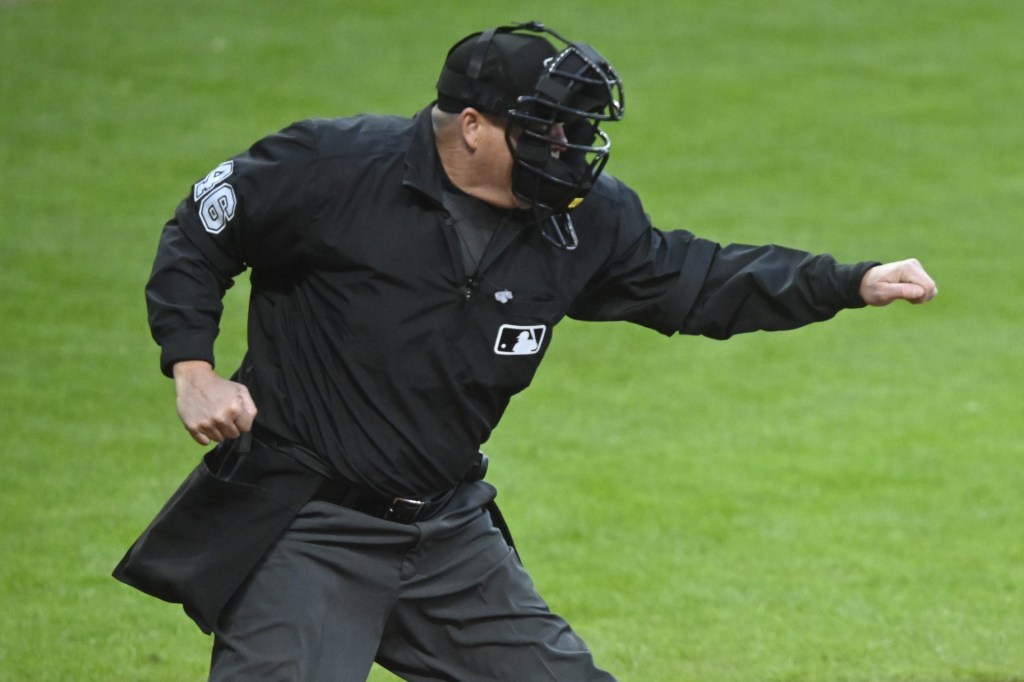
To most Atlantans, the sight was foreign. To Angelenos, it was familiar.
Trejo’s Tacos, the Los Angeles-based taco chain established by Danny Trejo, pulled up for the weekend in Atlanta to give out free tacos. For Rams fans, this was a boost to morale.
For Discover Los Angeles, which partnered with Trejo, this was an advertisement on wheels.
“Atlanta is actually a new advertising market for us,” says Jamie Foley, vice president of global communications at Los Angeles Tourism & Convention Board (of which Discover Los Angeles is a part). “We’re kicking off advertising here Feb. 10 and when the Rams made the Super Bowl, we thought this is perfect for us.”
So they made the trip early.
Come meet @officialDannyT and get free @TrejosTacos now at @NoMasCantina, Atlanta! All the way from L.A., #ComeFeelTheLove 😎❤️🌮 pic.twitter.com/JvUJCEBgR9
— Discover Los Angeles (@discoverLA) February 2, 2019
Super Bowl LVI is headed to the City of Angels in February 2022. Three years may seem like a long way out to start promoting such an event, but not for a city that will ultimately wait 29 years between Super Bowls. Los Angeles last hosted Super Bowl XXVII in January 1993. At the time, LA’s seven Super Bowls were tied with New Orleans for most of any city in the country.
Without an NFL team from 1995-2015, Los Angeles was ineligible to host a Super Bowl for two decades. New Orleans and Miami have since reached 10 apiece, safely in the lead.
READ MORE: Snapchat’s Super Bowl Includes Brands and Creative Tools
Along with Trejo, Discover Los Angeles featured another L.A. mainstay in Atlanta for Super Bowl week: Eric Dickerson. Along with being a legendary player for the Rams, recording the most rushing yards ever in a single season, Dickerson has been a fixture in the LA community for over three decades. Born a Texan, Dickerson was drafted by the Rams in 1983 before being traded in 1987 to the Colts. Even as he bounced around the NFL (including a stop with the Los Angeles Raiders in 1992), Dickerson maintained his residence in Los Angeles.
“We have a new stadium that’s not just a stadium, it’s the stadium,” Dickerson says of Los Angeles. “I think everyone will want to mimic that stadium. When you think of L.A., you think of Hollywood, you think of actors, you think of entertainment. You think of mountains. You think of the beaches, Venice Beach. You think of Rodeo Drive. You get all that in Los Angeles.”
Dickerson is talking about Los Angeles Stadium at Hollywood Park, the new venue in Inglewood that will house both the Rams and Chargers starting in 2020. The stadium will be able to expand to over 100,000 spectators for the Super Bowl and will include 275 executive suites.
Super Bowl LVI is still 3 years away, but @discoverLA brought @EricDickerson to #SBLIII Radio Row in Atlanta to start hyping the game up. The #SuperBowl was last played in Los Angeles in January 1993. pic.twitter.com/5f1HBqdnSx
— Jeff Eisenband (@JeffEisenband) February 3, 2019
But the Los Angeles Super Bowl will represent more than the NFL. The game will be the first of a string of major LA events, which include the 2023 College Football Playoff National Championship, the 2026 FIFA World Cup (Pasadena’s Rose Bowl hosted the 1994 World Cup Final) and 2028 Summer Olympics.
“We’ll have a new stadium, we’ll have more hotels downtown, the convention center is going through a renovation, so all of those pieces are critical,” Foley says. “Transportation will be connected to the airport by then, so you’ll be able to take public transportation to the airport, which is amazing. All those big changes will make it a pretty seamless experience.”
[mc4wp_form id=”8260″]
Being one of the major cities in America, Los Angeles doesn’t necessarily need to pitch itself from scratch to the world. However, after two decades without an NFL team, there is some skepticism of L.A.’s interest in football. After all, Mercedes-Benz Stadium felt like a home game for the Patriots, despite the Rams making a long-awaited return to the Super Bowl.
“We have an identity with a football team,” Dickerson says, specifically referencing the success of the Rams this season. “Most cities do. You think of Chicago, you think of New York, they have two teams too. You think of New England, the Patriots. You want to have that football team. Football’s rough and tough. It used to be rough and tough, not so much anymore. People want to drink beer and root for their team. You have that back in L.A. now. Just in the three years they’ve been there, you see so many people with Rams paraphernalia, Rams hats, Rams shirts, Rams shoes, something you didn’t see three years ago.
“We have some of the greatest fans there are. But they want a good product and I don’t blame them. In Los Angeles, there’s a lot to do. And sports sometimes aren’t the things they want to do because it’s inside and they want to be outside. But if you’re winning and it’s a nice, beautiful 70-degree day outside, why wouldn’t you go to the stadium?”
READ MORE: Inside the Revenue Generation and Marketing Frenzy of a Super Bowl
While the Super Bowl has always been a spectacle, since 1993, much has changed around the week. In 2003, the NFL moved the Super Bowl from one week to two weeks after the conference championship games, building an elongated lead-up to the game. This means more parties, more events and more media attention. For Los Angeles, that means even more glitz.
“I can’t even imagine how excited everyone in town will be to have this in their backyard,” Foley says. “Just looking at how star-studded Atlanta’s event is, I know LA is gonna show up big.”
Maybe L.A. native Adam Levine could have waited for his city’s Super Bowl, but that’s neither here nor there. There are other local stars to choose from for a Halftime Show… or the dozens of other performances that will take place in Los Angeles that week.
And maybe fans will pick up some Trejo’s Tacos while they are there.






![[Subscription Customers Only] Jun 15, 2025; Seattle, Washington, USA; Botafogo owner John Textor inside the stadium before the match during a group stage match of the 2025 FIFA Club World Cup at Lumen Field.](https://frontofficesports.com/wp-content/uploads/2026/02/USATSI_26465842_168416386_lowres-scaled.jpg?quality=100&w=1024)
![[Subscription Customers Only] Jul 13, 2025; East Rutherford, New Jersey, USA; Chelsea FC midfielder Cole Palmer (10) celebrates winning the final of the 2025 FIFA Club World Cup at MetLife Stadium](https://frontofficesports.com/wp-content/uploads/2026/02/USATSI_26636703-scaled-e1770932227605.jpg?quality=100&w=1024)









